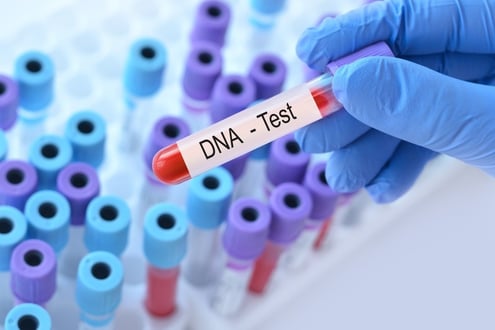Biomarker Testing for Breast Cancer
What are breast cancer biomarkers?
tests look at samples of blood, tumor or other tissue for changes or abnormalities caused by cancer. Tumor tests that are performed on blood are called liquid biopsies. tests can give doctors clues about the cancer, including:
- how fast the cancer is growing
- which treatments are most likely to work
- whether or not the cancer is responding to treatment or growing
- whether or not the cancer has come back after remission
tests may be used to select treatments, and help patients avoid side effects from treatments that will not work for them. See below for more information.
Estrogen, progesterone and testing
All breast cancers are tested for three common biomarkers:
- receptors
- progesteron receptors
- protein markers known as
Much of the treatment for breast cancer is based on the results of these tests.
testing and results
is a protein that is found on all breast cancer cells. Doctors use a test to measure the amount of a protein called on cancer cells. test results range from 0 to 3+. cancers contain a large amount of protein. These cancers are usually treated with targeted therapies known as "anti-HER2 therapy." See our section on Targeted Therapies for more information.
- A score of 3+ is considered . These cancers are often treated with anti-HER2 therapy.
- A score between 1-2 is considered HER2-low: In the past, these were considered . Some people with advanced HER2-low breast cancer may benefit from an anti-HER2 therapy known as Enhertu (trastuzumab deruxtecan).
- A score between 0-1 is considered HER2-ultralow: In the past, these were considered . Some people with advanced HER2-ultra-low breast cancer may benefit from an anti-HER2 therapy known as Enhertu (trastuzumab deruxtecan).
- HER2-negative: A tumor with a score of 0 is considered . These cancers do not respond to anti-HER2 therapies.
It's important for people with advanced breast cancer who were previously told they had to ask their doctor if they may benefit from additional testing to learn if their cancer is HER2-low or HER2-ultralow.
|
Test Score |
Status |
|
Score is 0 |
|
|
Score is more than 0 and less than 1 |
HER2-ultralow |
|
Score is 1+ or 2+ |
HER2-low |
|
Score is 3+ |
|
|
Possible test results and meaning |
|
Hormone receptors: (ER) and progesterone (PR)
Testing is done to look for two separate hormone receptors, receptors (ER) and progesterone receptors (PR).
- Cancers that test positive for and progesterone receptors are known as . They may also be called . These cancers are often treated with hormone therapies.
- Cancers that test negative for and progesterone receptors are known as or HR-negative. These cancers are not usually treated with hormone therapy.
()
Breast cancers that are negative for the biomarkers ER, PR and are known as triple-negative breast cancers. These cancers do not usually respond to hormonal therapies or anti-HER2 targeted therapies. For this reason, is often treated with chemotherapy. New approaches to treating include and targeted therapies. Additional testing can help people learn if they qualify for other treatments.
It's important for people with advanced breast cancer who were previously told they had to ask their doctor if they may benefit from additional testing to learn if their cancer is HER2-low or HER2-ultralow.
Prognostic tests for , breast cancer
Most breast cancers are treated with hormone therapy. Some cancers are more aggressive and more likely to recur. In these situations, patients may benefit from additional treatment with chemotherapy. These prognostic tests are used to predict:
- if the cancer is likely to come back
- the benefit of adding chemotherapy to the treatment plan
- how long hormonal therapy should be used
The most commonly-used prognostic tests for breast cancer include:
- Oncotype Dx
- Breast Cancer Index
- MammaPrint
- Prosigna
Minimal residual disease testing
() testing is a type of that looks for the presence of cancer in the blood after treatment. The test can be used to determine how well a treatment worked and the likelihood of cancer coming back after treatment. Although the test is available, it is not yet included as standard-of-care in the breast cancer treatment guidelines. Research is ongoing to determine the best use of tests.
Genetic testing for treatment using PARP inhibitors
Genetic testing for an may be used to guide treatment selection for people diagnosed with breast cancer. People with breast cancer who test positive for a , or mutation may benefit from treatment with a type of known as a .
In the News
The Role of HER2 Low in Breast Cancer
Participate in Research
Study of a New Investigational Inhibitor to Treat People with Advanced Solid Tumors
Clinicaltrials.gov identifier: NCT05932862
Biomarker testing for advanced cancers
Additional testing may be done to study the genes and proteins within the cancer to help doctors choose the best treatment. Some treatments will work best for people whose cancer cells have specific changes. These treatments are sometimes called targeted therapies. testing may also help people learn if they are eligible for certain clinical trials.
|
|
|
Details |
|
ER/PR/HER2 |
All stages |
Depending on the results, used to determine benefit of hormone therapy, anti-HER2 therapy, chemotherapy, and . |
|
ESR1 mutation |
Advanced or 4 |
Used for breast cancer for treatment with the drug Oserdu (olacestrant) or Inluriyo (imlunestrant). |
|
PIK3CA mutation |
Advanced or 4 |
Used for ER-positive, breast cancer for treatment with the drug PIQRAY (alpelisib). |
|
, PIK3 or AKT1 mutation |
Advanced or 4 |
Used for , advanced breast cancer for treatment with the Truqap (capivasertib). |
|
protein |
Advanced or 4 |
Used for () to identify patients most likely to respond to the drug Keytruda (pembrolizumab). |
Does insurance cover the cost for breast cancer biomarker testing?
Most private health insurers cover the cost for ER/PR and testing in patients with breast cancer. Insurers may cover the cost for additional testing for those who meet eligibility, however, out-of-pocket costs may vary depending on the type of test. Visit our sections on insurance and reimbursement for more information.



